

Tao Te Ching
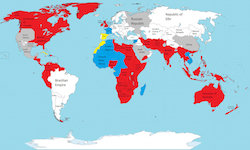
British Lineage
A living example of how an empire rises and falls, the British experience demonstrates important lessons world civilization ignores only at it's peril.
People (74)
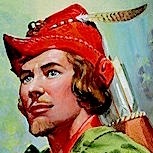
Robin Hood
1160 – 1247 CE
The historicity debate about Robin Hood may not be as much about if there really was one as about how many different ones there were. A symbol for history’s recurring story of class warfare, the rich against the poor, the economics and politics of keeping the highborn high and the lowborn low is as relevant today as it was in medieval England and the dawn of civilization. While in Chinese political philosophy, rulers were taught that if the poor were too poor it’s the government’s fault and the they have every right to steal, in European and American history the Robin Hoods were vilified. In Atlas Shrugged, Ayn Rand wrote, “until the last trace of Robin Hood is wiped out of men’s minds, we will not have a decent world to live in.”

William of Ockham
1287 – 1347 CE
Major intellectual figure during medieval times, Franciscan friar at the center of the biggest political controversies of his era, and famous for his principle now called Occam’s razor; William of Ockham’s commentaries were condemned by a council of bishops and he was commanded to defend himself at a papal court. Instead, he fled the country, took refuge with the Holy Roman Emperor, and was excommunicated. One of the first to encourage a strong separation between church and state, a liberal democratic ideology, and social contract theory; his Occam's Razor theory became a small-is-beautiful, less-is-more foundation for modern science and natural philosophy.
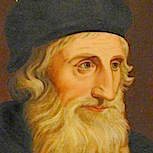
John Wycliffe
1320 – 1384 CE
Iconoclastic theologian, philosophical dissident, and champion of the common people; Wycliffe translated the Bible into English undermining Church authoritarianism and belief that people needed a spiritual mediator to tell them what was true, ethical and good. He criticized the political power, materialistic wealth and corruption common with the clergy and papal hierarchy of his time helping to even out the extreme rich-poor gap. He influenced Jan Hus, Martin Luther, and the beginnings of Protestantism; he was condemned as a heretic, his bones were dug up, his writings were burned and banned - and his influence continues.
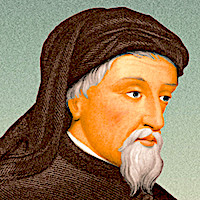
Geoffrey Chaucer
1343 – 1400 CE
“Father of English literature”
Scientist, philosopher, diplomat, “Father of English literature,” and greatest Middle Ages English poet; Chaucer transitioned literature in French and Latin to an English for the English-speaking. Also a page, bureaucrat, soldier, messenger, administrator, and valet; he portrayed and spoke for the common person. This support for the populace however created a backlash from the monarchy and he was fined and imprisoned. Claimed by the Protestant movement as an early forefather, he tried to separate religion from superstition, was rumored to have beaten up a Franciscan Friar on a public street, and supported religious reform.
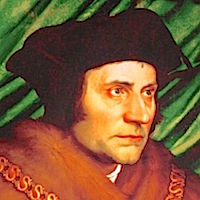
Thomas More
1478 – 1535 CE
Thomas Moore (1478 – 1535)
Christian humanist, Henry VIII confidant, ascetic, Lord High Chancellor of England, brave psychological explorer; Moore both embraced and went beyond his time and culture. On one hand opposing Martin Luther and the Protestant Reformation, he also protested against Henry VIII’s appropriation of the title, Supreme Head of the Church of England and was beheaded for his efforts. Living at a time of deep cultural transition when idle noblemen raised rents, created land enclosures, caused extreme poverty, starvation, and 72,000 English thieves were hanged; he helped revive a radical interest in Lucretius and Epicureanism. His book Utopia envisioned a society based on the pursuit of collective happiness and included universal health care, public housing, child care centers and a 6-hour work day rather than the prevalent materialism, nepotistic, personal advantage and power. G. K. Chesterton, Jonathan Swift, and many others considered him the greatest Englishman.
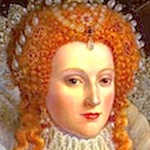
Elizabeth I (Gloriana, The Virgin Queen)
1533 – 1603 CE
Though far from a sage or saint, Elizabeth began her reign with England reviled and powerless but left it 45 years later rich and strong. Called by historians “The greatest ruler England has ever had,” she was patron to Shakespeare, Bacon, Marlowe, and Drake launching the scientific revolution and a golden age of progress and learning. Excommunicated by Pope Pius V, she believed that faith was personal, became “mother of the Church of England.” She opened up trade with the Islamic Ottoman Empire, and helped end the Vatican’s power over all Europe. Though stained by abuses in Ireland, she listened to popular sentiment and advice dedicating her life to her country and people becoming a symbol for good government and resistance to foreign threat.
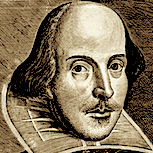
William Shakespeare
1564 – 1616 CE
The greatest writer in the English language whose works - 400 years after his death - have been translated into every living language and remain popular, respected, studied, and performed throughout the world; Shakespeare was as Ben Johnson wrote, "not of an age, but for all time.” When 18 years old, he had his first child 6 months after getting married and before long became a playwright and actor in his own and others’ plays. Unlike many of the prime movers on our biography lists, Shakespeare, though not revered, was successful during his lifetime (as a businessman) and by the time he was 33 while living in London owned the second largest home in Stratford. His influence not only revolutionized drama, scholars link more than 20,000 pieces of music to his writings, many famous paintings, his language helped shape modern English and common everyday phrases, Sigmund Freud drew heavily on him while developing his psychology theories, and Durant describes his influence as moving us to the depths of our spirit.
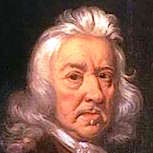
Thomas Hobbes
1588 – 1679 CE
Secretary, student, friend to Francis Bacon; Hobbes established the foundation for most modern political philosophy. Formulating social contract theory, he promoted individual rights, natural equality, government based on the will of the people, only representative government as legitimate, and the freedom to do anything that laws don’t forbid. He described human nature as “self-interested cooperation” and introduced mathematical reasoning to the philosophy of science. Though called “the father of totalitarianism” and fixated on peace and order, his radical shift from religion and belief to applying science for understanding human nature helped undermine that same “order” creating more personal, political freedom.
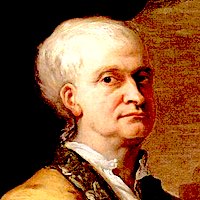
Isaac Newton
1642 – 1726 CE
Natural philosopher, mathematician, astronomer, theologian, author and physicist, and one of the most influential scientists of all time; Newton built the first practical telescope, made critical discoveries in the field of optics, developed calculus, made numerous scientific discoveries and also studied alchemy. He established science over faith as the most profound influence on modern thought and his discovery of gravitation revolutionized the study of astronomy. He established the laws of motion and mechanics that became a platform for the modern miracles of science. Exemplifying Gracian’s dictum, “All giants are really dwarfs,” stories of Newton’s absentmindedness proliferate. Asked to boil an egg for 3 minutes, he put his watch in the water and stared at the eggs. He would do things like go upstairs to change for a formal dinner but instead get undressed and go to bed. Voltaire considered him one of the greatest men who have ever lived.
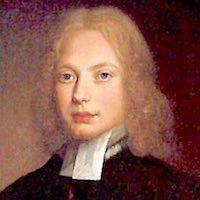
Jonathan Swift
1667 – 1745 CE
"Foremost prose satirist in the English language"
Poet, cleric, satirist, and political essayist; Swift became the most popular Irish author. His book, Gulliver’s Travels became the most popular work of Irish literature in international libraries. Although George Orwell said he disagreed with him on almost every issue, he listed him as one of his most-admired writers. Deeply involved in politics, he published many powerfully influential political pamphlets—all so provacative he had to publish anonymously or use a pseudonym.

Benjamin Lay
1682 – 1759 CE
Benjamin Lay (1682 - 1759)
Physical dwarf but moral giant, “the world’s first revolutionary abolitionist,” inspiration for generations, wild, confrontational, and uncompromising opponent of slavery; Benjamin Lay wrote over 200 polemics against slavery, sweatshops, over-consumptions, capital punishment, the prison system, decadent rich elites, and for vegetarianism, animal rights and sustainability. Living a lifestyle of almost complete self-sustenance, he grew his his own food, made his own clothes, lived in a cave eating only fruits and vegetables, and wouldn’t use anything that came from the killing of animals. Unconstrained even when abandoned by his fellow Quakers (who later commonly kept pictures of him in their homes), he became the prototype of a class and race-conscious, environmental ultra radical and pioneered ways of protesting still used today.
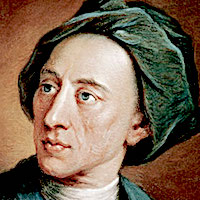
Alexander Pope
1688 – 1744 CE
Second most quoted English writer
Second most quoted English writer after Shakespeare, anonymous and profound influence on culture, compassionate commentator on humankind’s foolishness; Pope foresaw and criticized the growing materialism and consumerism of his era. His critiques were so pointed and insightful, they aroused such hatred that he was viciously slandered with lies and was forced to carry a pistol when he went for walks. From a Catholic family in England when Catholics were banned from teaching or going to a university; Pope’s aunt had to teach him to read and he was largely self-taught with help of sages like Homer, Horace, Virgil, Shakespeare, and Chaucer. Suffering ill health from an early age, he had a kind of tuberculosis from age 12 that turned him into a severe hunchback and limited his height unto only 4 feet, 6 inches. Transmuting his difficulties into art, he completed impressive translations, critical essays, and poems that created new forms as well as inspiring both people of his times and ours.
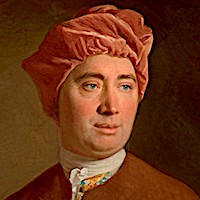
David Hume
1711 – 1776 CE
"One of the most important philosophers"
Hume's father died when he was two and his mother encouraged his education which developed him into a true polymath in philosophy, mathematics, science, economics, history and literature. His writing career began when he was only 16 but—popular with the ladies and aristocratic society—he kept most of his controversial, influential writings secret and they weren't printed until after his death. Mainly recognized as an historian during his life, his post-mortemly published philosophical works became a major influence on thought leaders like Francis Bacon, Descartes, Newton, Locke, Berkeley, Adam Smith and all who came after them. Kant said that Hume woke him up from his "dogmatic slumbers."
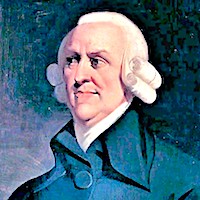
Adam Smith
1723 – 1790 CE
''The Father of Economic Capitalism"
Economic pioneer, moral philosopher, professor, and major influence on the Scottish Enlightenment; Adam Smith helped create the "cult of the free market" when he published The Wealth of Nations—one of the or the most influential books on economic theory ever written. Unlike many famous and influential books that were virtually unknown during the author's life, the Wealth of Nations went through 5 editions while Smith was still living. A close friend and advisor to David Hume, Smith also had frequent conversations with Benjamin Franklin, Gibbon, Burke, and knew Voltaire. He put his economic theories into practice converting his home town of Glasgow's business leaders to his policy of free trade. Kidnapped by gypsies when young, Smith refused the expected ordination after 6 years studying at Oxford, and turned conventional morality upside down by proclaiming being rich as the same thing as having integrity.
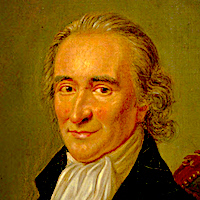
Thomas Paine
1737 – 1809 CE
Fired from his government post in England because of his efforts for the working class and running to escape debtor’s prison, Paine brought a letter of recommendation from Benjamin Franklin to the new world and quickly established himself as a voice for freedom, liberty, women’s rights, prison reform, Newtonian science, and anti-slavery efforts. From a poor family growing up during a time when thousands of small farmers were becoming serf-like factory workers and the gap between super rich and super poor was becoming extreme; he educated himself, became a Founding Father, one of the most essential influences on the Revolutionary War, gave the United States of America it’s name, and wrote the rough draft that Jefferson used to craft the Declaration of Independence. John Adams said that, “Without the pen of Paine, the sword of Washington would have been wielded in vain.” The first to lobby for a Social Security system, his influence extended from American to England, France, South America, and all countries seeking freedom, social justice, and moral equality.
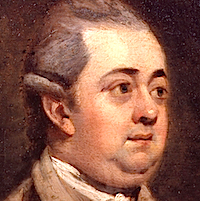
Edward Gibbon
1737 – 1794 CE
One of history’s most important historians, Gibbon made groundbreaking contributions to our understanding of not only the Decline and Fall of the Roman Empire but to the factors that help or hinder the rise and fall of all countries, governments, and civilization itself. From an objective perspective that appreciated the civilizing influence of religion while maintaining a skeptical, non-believing openness; he examined the impact of Christianity and organized religion on a free. healthy, diverse society. His conclusion was that while they addressed deep psychological needs, they easily become subservient to political power and their main influence undermined the evolution and establishment of a sane and just society.
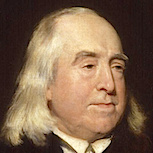
Jeremy Bentham
1748 – 1832 CE
Jeremy Bentham (1748 - 1832)
“The first patron saint of animal rights,” founder of modern utilitarianism, philosopher, and social reformer; Bentham defined “the greatest happiness of the greatest number” as a political strategy and brought the idea of welfare into modern government. A strong voice for individual and economic freedom, he worked hard to end slavery, the death penalty, physical punishment, and was the first in England to argue for decriminalizing homosexuality. He promoted equal rights for women, universal education, the separation of church and state, and animal rights. His secretary was John Stuart Mill’s father and together they tested the limits of education.
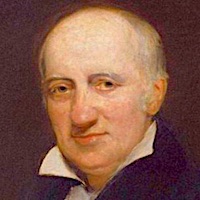
William Godwin
1756 – 1836 CE
Provocative and influential social, political, and literary critic
Mary Shelley’s father, married to pioneering feminist Mary Wollstonecraft, journalist, philosopher, publisher, translator, and author; Godwin became the first to promote utilitarianism and modern anarchism. He attacked aristocratic privilege, advocated the abolition of marriage, wrote numerous novels, and became a major influence on British literature and culture. His views on progress, life extension, and human perfectibility gave inspiration for his daughter’s novel, Frankenstein. He opposed Malthus, became a literary influence on Dickens and Poe, a political influence on Peter Kropotkin, libertarianism, and communism.

William Blake
1757 – 1827 CE
A poet, painter, and songwriter mainly unrecognized during his life and at the time considered mad, Blake is now called “far and away the greatest artist Britain has ever produced” and “a seminal figure in the history of poetry.” Not fully appreciated until more than 200 years after he died, he’s now considered one of the most powerful impacts on twentieth century culture with an enormous influence on Carl Jung, Aldous Huxley, poets like William Butler Yeats and Allen Ginsberg, songwriters like Bob Dylan and Van Morrison. The origin of graphic novels and fantasy art trace back to Blake.
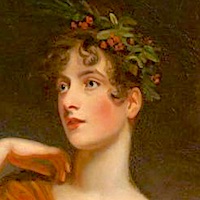
Mary Wollstonecraft
1759 – 1797 CE
Seminal feminist
Founding feminist philosopher, wife of anarchist forefather William Godwin, and mother of famous writer Mary Shelley; Wollstonecraft was one of the first in the West to advocate for women’t equality and rights. She wrote and spoke against the prevailing view that women are inferior to men and argued that women only appear inferior because of a lack of education and opportunity. Although stridently criticized by her contemporary writers and for 100 years by most believing ‘no self-respecting woman would read her work,’ she was a foundational influence on Jane Austen and scholars have traced her ideas in Pride and Prejudice, Sense and Sensibility, and as a character in Persuasion. Her influence expanded with rise of feminism in the 1960s and 1970s and continues today.
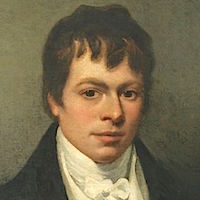
Robert Burns
1759 – 1796 CE
Tenant farmer, tax collector, "The Greatest Scot of all time,” people's poet of Russia, political radical, and writer of one of the wold’s most popular songs (Auld Lang Syne); Burns celebrated everyday life, farming, culture, religious practices, and love. Father of at least 13 children (most born out of wedlock) with at least 5 different women, his affairs were unencumbered even by loves who inspired some of the best love songs ever written. Far beyond it’s place as favorite US New Year’s Eve song, Auld Lang Syne is sung all over the world, was the Korean and Maldive national anthem, popular graduation song in Japan, and sung by troops in the American Civil War and during World War I.

William Wordsworth
1770 – 1850 CE
Orphaned at an early age, connected with the common man while wandering through Europe on foot, caught up in both the ups and downs of the French Revolution, and Britain's only Poet Laureate who wrote no official verse; Wordsworth defined poetry as "the spontaneous overflow of powerful feelings” and along with Samuel Coleridge, used poems based in common language to help launch the Romantic Age of literature. A student of John "Walking" Stewart who blended yoga and Eastern wisdom from India with western pantheism, he published some of the most influential poetry in Western literature.
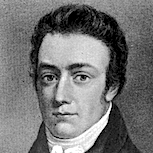
Samuel Taylor Coleridge
1772 – 1834 CE
One of the most influential English poets, co-founder of the Romantic Movement, prominent philosopher, gothic pioneer and leviathan impact on Mary Shelley, William Wordsworth, Thomas Carlyle, Emerson and American transcendentalism; Coleridge paid for his renown with poor health, depression, bipolar disorder, and a lifetime of opium addiction. Rescuing Shakespeare’s play Hamlet from denigration by critics, he established his reputation as aliterary critic. The instigator of "Conversational Poetry,” using common, everyday language to convey deep images and wisdom, he coined many still-used words like soulmate, selfless, pessimism, relativity, narcissism, actualize, and intensify
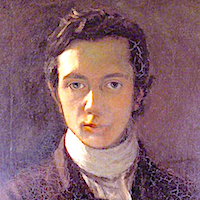
William Hazlitt
1778 – 1830 CE
One of the English languages best art and literature critics of all time
The most influential art critic of his age, considered the best essayist in the English language, and one of the English language’s greatest critics; Hazlitt befriended and helped Coleridge, Wordsworth, Keats, Jeremy Bentham, Stendhal and many of the 19th century’s most important writers. The keen psychological insight that makes him still relevant today however, didn’t go over very well in his own time. Both Wordsworth and Coleridge retaliated to his criticism by spreading negative rumors. Also a poet, journalist, and philosopher; he was devoted to his work but seldom popular enough to earn sufficient income, he had to depend on his wife’s independent wealth. When she left him, he continued his writing but sunk into poverty, illness, depression, and was “excommunicated from all decent society.”
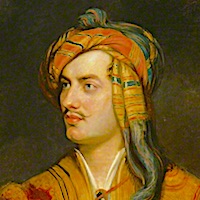
Lord Byron (George Gordon Byron)
1788 – 1824 CE
The first rock-star style celebrity
One of the best English poets, Greek national hero, first modern "rock-star" celebrity, revolutionary, politician, and major Romanticism influence; Lord Byron became renowned for a flamboyant bisexuality during a time when this was highly illegal. A major influence in the Romantic movement and close confidant of Percy Bysshe Shelley, he was known as "mad, bad, and dangerous to know." During his lifetime considered the greatest poet in the world; his fame continues throughout the world in 36 different Byron Societies, in over 40 operas, in his poetry set to music by Beethoven, Schubert, Schumann, Berlioz; and through the legacy of his daughter, a founding force in the first computer programming efforts.
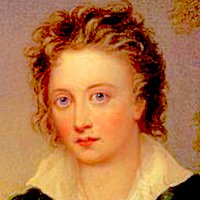
Percy Bysshe Shelley
1792 – 1822 CE
Another culture-transforming sage not recognized or appreciated during his lifetime, Shelley became regarded as one of the English language’s premier poets and transformers of political and social culture. A major influence on Thoreau's views on non-violent protest, political action, and his book, Civil Disobedience; he also inspired Karl Marx’s economic theories, Leo Tolstoy’s approach to non-violent resistance, Mahatma Gandhi, Martin Luther King Jr., and the world’s various Civil Rights Movements. During his 29-year life, most publishers became too afraid of being arrested to publish his work and his readership remained small and underground. From his tiny seed, however, our modern, humanistic culture sprouted.
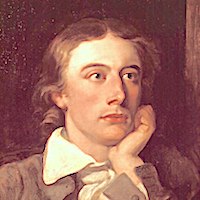
John Keats
1795 – 1821 CE
Writer of "poems as immortal as English"
One of the most popular poets of all time, Keats—in just 25 years of life—wrote what Will Durant called, “poems as immortal as English, and more perfect than Shakespeare.” Borges said that reading him was the most influential literary experience of his life, Tennyson called him the greatest poet of the 19th century, and Shelley wrote that his death was a national tragedy. He studied medicine and received a license to practice as a doctor and surgeon but chose the pure poverty of writing over financial security and social respect. During his lifetime, he published three volumes of poetry but during that time, sold only c. 200 copies. And far from foreseeing his future popularity, shortly before dying wrote, "I have left no immortal work behind me—nothing to make my friends proud of my memory.” His fame quickly grew however and his legend continues today in universities, movies, and books by authors including Dan Simmons, Tim Powers, and Julie Bozza.
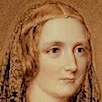
Mary Shelley
1797 – 1851 CE
Caught between her famous father’s Enlightenment political theories (William Godwin) , her famous husband’s allegiance to the ethos of Romanticism (Percy), and her famous mother (Mary Wollstonecraft) who is considered a founder of feminist philosophy; Shelley’s work promoted Taoist-like values emphasizing collaboration over competition, compassion over personal gain, the true civilizing role of the feminine principle. Her novel, Frankenstein foreshadowed our modern era and how easily we can become enslaved and manipulated by our inventions. A voice against superstition and dogma, her books became a beacon for the era of Romanticism, liberal politics, and gender equality.
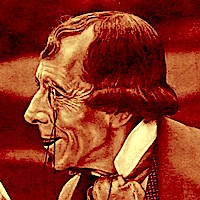
Disraeli, Benjamin (Earl of Beaconsfield )
1804 – 1881 CE
Political balance between mob rule and tyranny
Highly accomplished two-time UK Prime Minister (and only one ever born Jewish), active novelist, poet, close friend of Queen Victoria, and one of the most influential European statesman; Disraeli led a complex and difficult to categorize life. Many saw him as an eloquent charlatan; many as a strong, capable, and patriotic leader. Countering the status quo attitude toward Jews as being inferior, he redefined Judaism as race rather than religion and described Jews as superior in talent and influence. This ironically, may have led to the later fear and resentment toward Jews that culminated in programs and concentration camps. A founder of the modern Conservative party, he brought an isolationist Britain into collaboration with Europe. After the failed Indian Mutiny of 1857 (caused by pig and cow greased bullets) and the annexation of India to Britain, he proclaimed Queen Victoria “Empress of India.” Although he promoted a kind of paternalistic monarchy and imperialism, his voice remains relevant in the ever-challenging balance between overly democratic mob rule on one side and autocratic tyranny on the other.

John Stuart Mill
1806 – 1873 CE
One of the most influential thinkers in history, Mill learned Greek at 3 years old, studied Euclid and Latin at 8, Plato at 10, logic and Aristotle at 12, Adam Smith and political economy at 13, chemistry and zoology at 14, and by 20 was suicidal only to be saved by the poetry and inspiration of William Wordsworth. He promoted individual freedom over state control, economic democracy over capitalism, the environment and quality of life over unlimited growth, taxing unearned income high and earned income not at all. He linked freedom with self-improvement, worked to end slavery, and was one of the first in his time to advocate equality for women.
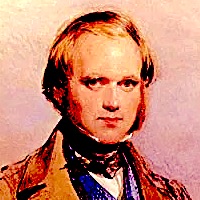
Charles Darwin
1809 – 1882 CE
Revolutionary scientist, one of the most influential characters in human history, and originator of the theory of evolution and natural selection; Charles Darwin generated a scientific consensus that recast humanity’s understanding of itself. Following his father’s decisions, he became a failure in his early academic efforts, a failure in his studies to become a doctor, and a failure in his career as a clergyman because of his intense interesting in beetles and entomology. He traveled to remote islands studying coral reefs, barnacles, animals, fish, insects of all kind and was “struck with the variability of every part in some slight degree of every species.” Unlike Thoreau’s book Walden that didn’t sell enough copies to cover the paper cost, Darwin’s book, The Origin of Species sold out on the first day in print launching a debate that soon led to a dual between scientists and became a controversy that continues today. He studied earthworms for 40+ years and this became the topic of his last book which he wanted to write quickly "before joining them.”
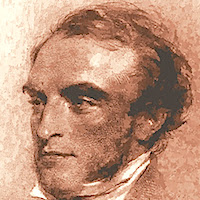
James Legge
1815 – 1897 CE
Prolific translator, editor of the first Chinese newspaper in Hong Kong, publisher of the first major volume of Chinese poetry into English, first Professor of Chinese at Oxford University, Christian missionary to China for 33 years; Legge helped translate the extensive Sacred Books of the East series, 50 volumes of Chinese classics. His purpose in this though was to provide knowledge and understanding to Christian missionaries so that they could better convert Chinese so his translations easily became corrupted by his strong sectarian point of view. In spite of these flaws, his work helped make great strides in helping “West meet East.”
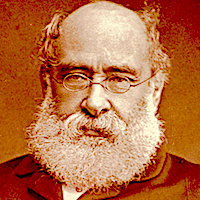
Anthony Trollope
1815 – 1882 CE
Novelist as teacher
Victorian novelist, political aspirant, writer of 47 novels and many short stories; Trollope focused his popular stories on everyday, householder events—situations average people could identify with and learn from. He understood and vividly described the role of money and materialism in the daily business of common people, officials, and institutions. They examined the time’s social, political, and cultural issues like the unfortunate role of women in Victorian society. His influence spread through his fans—people like Prime Ministers Harold Macmillan, Sir John Major, and John A. Macdonald; John Kenneth Galbraith, W. H. Auden, George Elliot, Sue Grafton, Edward Fitzgerald, and David Mamet. Alec Guinness liked his books so much, he never traveled without one and Siegmund Warburg said "reading Anthony Trollope surpasses a university education.”
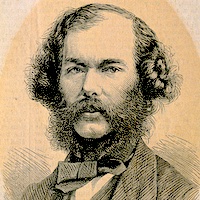
George Henry Lewes
1817 – 1878 CE
English philosopher and soul mate to George Eliot
Lewes' writings emphasized the collaborative potential between metaphysics and science and the creative freshness of his views helped evolve his era's understanding of both philosophy and psychology. His main influence though may have come anonymously through his discussions with his lover, George Eliot.
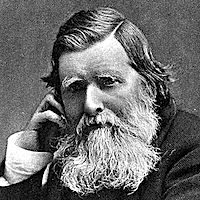
John Ruskin
1819 – 1900 CE
John Ruskin (1819 - 1900)
Strong and continuing international advocate for sustainability and protecting the environment, Christian socialist, leading Victorian era art critic, poet, philanthropist, and social thinker; Ruskin wrote over 250 manuscripts, influencing his contemporaries and many strands continuing today into modern culture. Admired by Proust, Gandhi, and Ryuzo Mikimoto in Japan; Leo Tolstoy called him, "one of the most remarkable men not only of England and of our generation, but of all countries and times.” Emphasizing the unity of nature, art, and culture; he developed principles for an ideal society which were used to set up many “Utopian Colonies.” His ideas helped found the modern Olympic Games, the British welfare state, many kind of social insurance programs, as well as the “garden city movement” that first included "greenbelts" in urban planning.
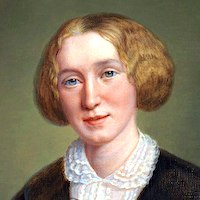
George Eliot (Mary Anne Evans)
1819 – 1880 CE
Pioneering literary outsider
Poet, journalist, translator, novelist, agnostic humanist, political agitator, and courageous follower of her own path; George Eliot wrote what some consider the best novel ever written in the English language (Middlemarch). Known for their psychological insight, her novels reflected her personal experience on the edges of the social, religious, and political fringe. Using a male pen name to escape the strong, feminine stereotypes of her era, this strategy also helped shield her from personal life scandals arising from norm-breaking situations like her adulterous relationship with philosopher George Henry Lewes and her marriage to John Cross who was 21 years younger. Her father didn't consider her beautiful enough to ever find a husband but clearly saw her high intelligence and financed a classical education for her far beyond what was normally available for women. Her father's wealth and high social status also gave her a clear perception of the extreme contrasts between the rich landowners and impoverished people living on those estates. This became a frequent theme in her books.

Florence Nightingale
1820 – 1910 CE
The founder of modern nursing, she started the first secular nursing school in the world, emphasized preventive medicine and holistic health, improved healthcare for all classes as well as hunger relief in India. She helped abolish harsh prostitution laws and expanded acceptable roles for women. A strong Christian, she was critical of organized religion, appreciated pagan and eastern religions, and strongly opposed discrimination of all kinds. She inspired worldwide health care reform and her work improved the situation for women everywhere. Her influence remains strong and the Florence Nightingale Declaration has been signed by over 18,500 nurses from 86 countries.
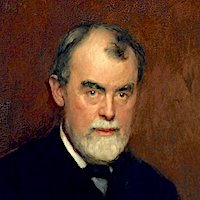
Samuel Butler
1835 – 1902 CE
Iconoclastic philosopher, artist, composer, author, and evolutionary theorist
Friend and student of Charles Darwin, serio-comic satirist, champion of small-is-beautiful everyday experience; Butler composed Handelian-style cantatas and piano pieces, painted works of art hung in London museums, and translated the Iliad and the Odyssey that he believed were written by a Trojan and by a Sicilian woman. In his book Erewhon, crime is considered a disease while disease and physical imperfections are considered crimes. Aldous Huxley thought Butler's ideas transformed Western culture's attitudes toward crime, technology, and 'progress'.
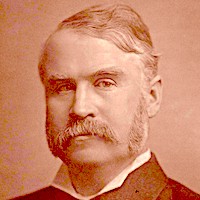
W. S. Gilbert
1836 – 1911 CE
Innovative, influential, inspiring dramatist
Poet, illustrator, and dramatist; Gilbert wrote 14 comic operas with music written by Sir Arthur Sullivan and over 75 plays—many still being performed c. 150 years after they were written. Ridiculing party politics, nepotism, patriotism, and the British class system; they may have not gone out of style because they were never in any kind of conventional style to start. The innovative creativity in their performances came in part from their ability to finance the productions themselves rather than having to rely on conventional funding that required artistic restraints and conformance to traditional methods. Gruff and quick-tempered on the outside, warm and a loyal friend when close, Gilbert set new styles and became an important influence on most playwrights that came after him especially in the line of Oscar Wilde and George Bernard Shaw.
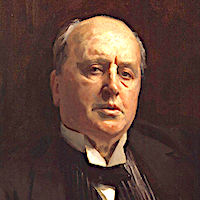
Henry James
1843 – 1916 CE
One of history’s greatest novelists, brother of William James, and 3-time Nobel Prize nominee; Henry James pioneered experimental literary techniques that deepened characters from overly simplistic caricatures to realistic depictions of ambiguity, paradox, and contradiction. Breaking from the romantic tradition of Charles Dickens, he experimented with literary styles and introduced more realism trying to involve readers more personally and influence them emotionally rather than just as distant and uninvolved observers. This attracted much criticism but also evolved literary styles to include more emphasis on psychological states of mind and the ability to inspire.
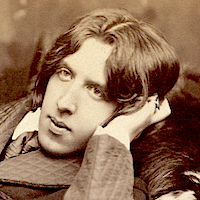
Oscar Wilde
1854 – 1900 CE
Oscar Wilde (1854 - 1900)
Prolific Irish poet, writer, journalist, and one of the most successful playwrights of his time; Wilde rebelled against his moralistic, Victorian environment with an “unequivocal inclination toward the unconventional” favoring passion and sensual pleasure. Strongly influenced by his teacher, John Ruskin, he transformed his more hedonistic tendencies into deep social concerns and wrote against decadence, duplicity, and libel. Married and with two sons, his writings went against popular opinion by describing women as creative and intelligent. His liaisons with men however led to a trial for homosexuality, incarceration, a severe injury in prison after collapsing from illness and hunger, and later death in extreme poverty. In many ways, his life seems to have exemplified his famous aphorism, “No good deed goes unpunished.”
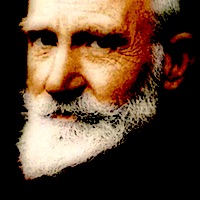
George Bernard Shaw
1856 – 1950 CE
UK playwright second only to Shakespeare
Playwright second only to Shakespeare, political activist, provocative idea generator, theatre and music critic; Shaw wrote over 60 plays, won a Nobel Prize in Literature, and an Academy Award. He promoted, popularized, and evolved the ideas of luminaries like Nietzsche, Samuel Butler, Marx, Shelley, Blake, and Dickens while using his plays to advocate for political and religious ideals as well as many controversial topics like promoting eugenics, opposing organized religion and vaccinations, criticizing both sides during World War I, and expressing esteem for dictators like Mussolini and Stalin. An insatiable originator, he frequently and intentionally proposed contradictory views, controversial political stands, and declined all public honors. He worked hard encouraging people to think for themselves
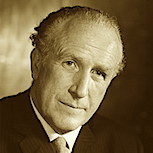
Arthur Desmond
1859 – 1929 CE
Arthur Desmond (c. 1859 – 1929), aka Arthur Uing, Ragnar Redbeard, Richard Thurland, Desmond Dilg, Gavin Gowrie
Bank-bashing heroic reformer, “The Poet of Revolution,” author, and politician; Desmond started a political organization dedicated to “emancipation from poverty, competitive commercialism, industrial wage slavery, tyrannical authority, and mental bondage." Like Machiavelli and his satirical book The Prince, Desmond was slandered by the rich and powerful plutocrats of his time as an immoral, satanic figure, advocating Social Darwinism, racism, and fascism. His book, Might Is Right, however, was called by fellow labor movement collaborators, “one of the greatest books ever written." He promoted land reform, the nationalization of large estates and banks, single taxation and called bank directors "scoundrels", large estate owners "blood-sucking leeches" and the local press as "hirelings of monopoly.”
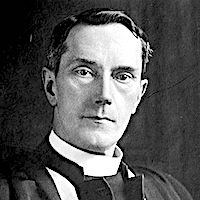
Dean Inge
1860 – 1954 CE
Christian mystic and philosopher
Although a prolific writer of 35+ books and nominated 3 times for the Nobel Prize in Literature, Inge isn’t a very well known historical figure. His insight, however, was deep and his influence on modern—at least Christian—culture profound. Author, priest, professor of divinity, passionate animal rights supporter, and Dean of St Paul's Cathedral; he criticized the Roman Catholic Church, disapproved of democracy, promoted nudity and eugenics. A serious, preaching Christian but on the mystical side, he advocated the philosophy of Plotinus and a kind of autonomous religion based on personal experience rather than external authority.
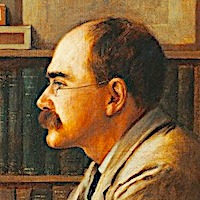
Rudyard Kipling
1865 – 1936 CE
Greatest—in-English—short-story writer
Journalist, poet, novelist, major short story writing innovator, youngest and first Englishman to receive the Nobel Prize in Literature; Kipling was born in India and quickly became one of the most popular prose and verse writers of his era. Accused by critics of racism, misogyny, and imperialism; George Orwell believed that Kipling sold his soul to the British, colonial establishment and he did support a military figure responsible for a massacre. A contemporary Indian writer said he had a much better understanding of animals than of the Indian people he wrote about. However, his fame endures, his children’s books remain popular classics, his poetry is still being recorded, his adult fiction is still in print, and his deep influence on Scouting movements continues.
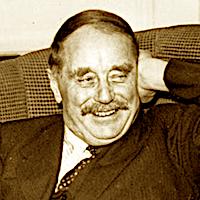
H. G. Wells
1866 – 1946 CE
A father of science fiction and One World Government apostle
Social critic, journalist, prophetic futurist, and “A father of science fiction”; Wells—a prolific writer of novels, social commentary, and history—wrote more than 100 books. He envisioned the World Wide Web, nuclear weapons, satellite television, mass surveillance, and many other un-invented but now common technologies. He also explored both the positive an negative ways of integrating them into civilization. An outspoken socialist and proponent of equality and human rights, Wells had a strong influence on his friend Winston Churchill who peppered his speeches with Wells-quotes. Nominated for the Nobel Prize in Literature four times, his influence extended to almost all modern science fiction writers. A strong believer in the need for us to become citizens of the world under a One World Government, he helped create the UN-adopted Universal Declaration of Human Rights. He worked hard on the creation of the League of Nations but disappointment with its effectiveness and inability of politicians to elevate the common-world good over their personal benefits led to his conjecture that it might be better for another species to replace humanity.
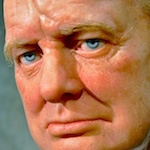
Winston Churchill
1874 – 1965 CE
At the top of world politics for 50 years and one of the most influential leaders in all history, Churchill was also an accomplished artist, an author who won the Nobel Prize in Literature, and amateur bricklayer who bred butterflies. A Cassandra of his time, he very early and almost alone warned of Hitler and Nazi Germany, Stalin and the Soviet threat, and Gandhi’s approach to Indian Independence leading to the Islamic consequences we’re suffering today. Overcoming a serious speech impediment, his radio broadcasts and communications held Britain together when they were standing almost alone against Hitler, helped bring vital US support, and win WW II.
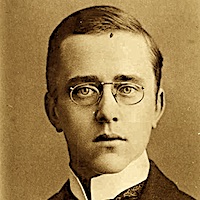
Lionel Giles
1875 – 1958 CE
Victorian "Taoist at heart"
Translator, philosopher, sinologist, and museum curator; Giles followed in his father's footsteps—Herbert Giles who co-created the famous Wade-Giles method of Chinese translation. His translation in 1910 of Sun Tzu's Art of War made monumental strides in accuracy over previous translations. Some of his other translations include The Analects of Confucius, the Sayings of Lao Tzu, the Book of Mencius, A Gallery of Chinese Immortals, and Taoist Teaching of Lieh Tzu.
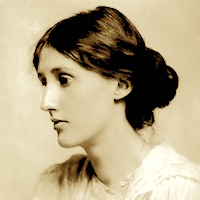
Virginia Woolf
1882 – 1941 CE
Stream of consciousness writing pioneer, one of the most influential 20th century writers, “the major lyrical novelist in the English language,” and “feminist inspiration;” Woolf struggled with mental illness all her life and yet wrote some of the era’s best short stories and novels, some translated into 50 languages. A deep influence on world culture, she promoted universal education, intellectual freedom, class equality, and feminism. Still popular today, the National Portrait Gallery in London sells more of her postcards than of any other. With a deep understanding of inner, psychological struggle, her characters expose the sacred within the ordinary, the profound in the midst of the commonplace.
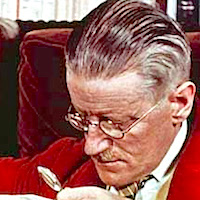
James Joyce
1882 – 1941 CE
James Joyce (1882 – 1941)
Polyphonic novelist, poet, one of the most influential 20th century writers, stream of consciousness avant-garde modernist; Joyce revolutionized modern fiction while - according to a psychoanalyst - using his writing to avoid a complete psychotic break. A huge influence on philosophers and writers as varied as Borges, Rushdie, Beckett, Robert Anton Wilson, Joseph Campbell, and John Updike; his influenced crossed over into the world of science as he became the source of the now popular scientific term, “quark..” Finnegans Wake - considered the most challenging work ever written in the English language - shines as a monument to the possibilities of creative spirit unshackled by regard for public opinion. Although considered one of the greatest novels ever written., controversy and resistance kept his novel Ulysses from being published in the USA until 12 years after it was written. His writing style and content brings out the deeper reality of situations and experiences pointing toward the sense rather than the words.
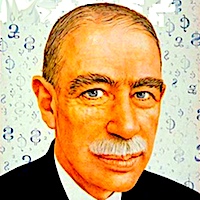
John Maynard Keynes
1883 – 1946 CE
Revolutionary economist credited with saving capitalism
One of the most influential economists of all time, founder of modern macroeconomic theory, most effective strategist in ending the great depression, and leading representative of modern liberalism; Keynes became one of the most important and influential thinkers of the 20th century. Promoting the—at the time—radical idea that governments should spend money they don't have may, he helped jump-start the world’s economies out of depression and into history’s most affluent periods. Challenging the prevalent economic theories of Adam Smith, most of the developed world adopted his theories, government policy focused on demand instead of supply, prosperity spread. Attacked by monetarists like Milton Friedman in the 1970’s his recommended policies fell from favor which led to the the 2007-8 financial crisis until they were re-adopted.
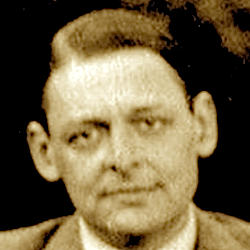
T. S. Eliot
1888 – 1965 CE
T.S. Eliot, Thomas Stearns Eliot (1888-1965)
Literary and social critic, "one of the twentieth century's major poets,” publisher and playwright, Nobel Prize winner and “the poet of the modern symbolist-Metaphysical tradition;” T.S. Eliot wrote some of the best known English poems. Reversing the more common trend, he was more respected during his lifetime, less so after but still almost universally acknowledged as a pioneering and major influence on modern poetry. He emphasized insight and poetry arising from the unconscious mind. Often accused of anti-Semitism, he described himself as a "classicist in literature, royalist in politics, and anglo-catholic in religion".
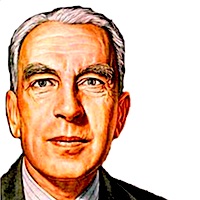
Arnold Toynbee
1889 – 1975 CE
Philosopher of history, international affairs expert, research professor, and prolific author; Toynbee was the the world’s most translated, read, and discussed scholar for much of the 20th century. He wrote hundreds of books and articles translated into more than 30 languages. Applying his insights from studying history to modern political problems, he became a delegate to the 1919 Paris Peace Conference, worked in the British Foreign Intelligence Office, and held a long-term position at the London School of Economics. His historical studies led to persuasive theories about how civilizations arise as a response to extreme challenges by "creative minorities" and how these solutions change the course of cultural evolution. Believing that civilizations most often die from suicide rather than invasion or natural causes, he describes the process of how civil-success leads the people and leaders to a kind of complacency full of nationalism, militarism, and oppressive tyranny.
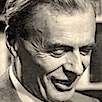
Aldous Huxley
1894 – 1963 CE
With deep insight and keen intelligence, Aldous Huxley for decades using almost every form of media to provide a penetrating commentary on contemporary civilization. Described as “the prophet of the 20th century,” he was nominated for the Nobel Prize in Literature 7 times. He brought into spotlight a vivid image of both the unconscious dark and potential brightness of our evolving technology, social, and political forms animating the dangers of consumption, conformity, technology dependence, indulgence, and pleasure-seeking as well as the potential of the perennial philosophy, finding deep meaning, understanding the sense and not just the words, experiencing the sacredness of each moment.
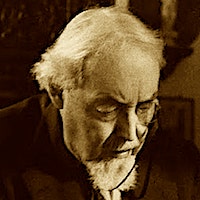
Wei Wu Wei "O.O.O.", Terence James Stannus Gray
1895 – 1986 CE
Skillful translator from Taoist insight into modern, English language
Wei Wu Wei's cousin founded the UK Royal Ballet while he created the Cambridge Festival Theater, produced more than 100 plays, wrote books on ancient Egyptian history and culture, raised his family's racehorses, won 11 major races, and married a Georgian princess and a Russian noblewoman. His wealth, success, and fame, however, left him empty and without meaning. He took on the pseudonym, Wei Wei Wei, and wrote 8 books and numerous articles that brought insight and ancient wisdom into modern language. Befriending Lama Anagarika Govinda, Dr. Hubert Benoit, John Blofeld, and Dr. D. T. Suzuki; he helped translate and bring the insights of Taoist and Buddhist understanding into modern, cultural influence.
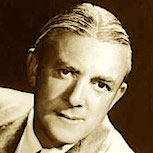
James Hilton
1900 – 1954 CE
Writer of the first paperback novel (PocketBooks #1 said to have started the "paperback revolution"), Academy Award winner, author of 22 books, and creator of the now famous "Shangri-La;” Hilton imagined, populated, and launched into our cultural consciousness his depiction of a happy and enlightened group living in a remote, secret, almost inaccessible, and secret land protecting the best of culture during a dark age. Many cultures have similar myths but his was so powerful Franklin D. Roosevelt used it as name for the presidential retreat now called Camp David and China recently renamed an entire mountain region after it. Many of his characters exemplified a deep wisdom and appreciation for doubt over belief.
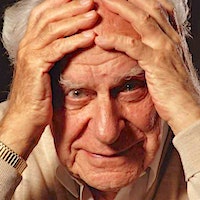
Karl Popper
1902 – 1994 CE
Major Philosopher of Science
Social commentator, philosopher, and academic; Popper grew up in an academic household. His parents were good friends of Freud's sister and his father was a true bibliophile with as many as 14,000 books in his personal library. During his student years, he became very interested and supportive of Marxism until police shot 8 of his unarmed friends. That led him to a life-long support of social liberalism and his creation of an evolved philosophy of science. One of his students—George Soros—became a philanthropic billionaire and now support a think-tank dedicated to Popper's influence. Rather than fixating on just one point of view, he worked to reconcile diverse ideas from socialism, libertarianism, social democracy, traditional liberalism and conservatism.
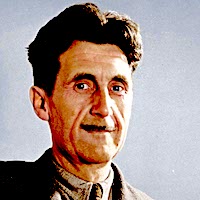
George Orwell
1903 – 1950 CE
English, poet, humanist, apostle of doubt, and powerful political influence
George Orwel, Eric Arthur Blair (1903–1950)
Novel-writing journalist, one of the best English essayists, ranked second on a list of "The 50 greatest British writers since 1945,” insightful literary critic, humanist, poet and powerful political influence; Orwell transformed a life filled with failure, poverty, and humiliation into literary genius and cultural influence. Originator of many words and phrases that have become part of popular culture—"Thought Police", "Big Brother", “Cold War,” "memory hole", "doublethink", “Orwellian,” and "thoughtcrime”—his writing exposed intellectual hypocrisy, social injustice, totalitarian and authoritarian influences, and turned his difficult experiences into great literature.

John Blofeld
1913 – 1987 CE
When very young, Blofeld came upon a statue of the Buddha and the experience changed his life redirecting it toward the East where he taught and traveled throughout Hong Kong, Tibet, Mongolia, China, India, and Burma. Many of these experiences were before the Cultural Revolution in China so offer a rare glimpse into that pre-Communist world. While studying and practicing with famous Chan and Vajrayana masters like Hsu Yun and Dudjom Rinpoche, he wrote 18+ books that have had a singular and deep influence bringing Eastern insights and practices to the West.
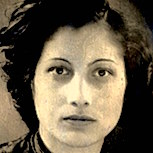
Noor Inayat Khan
1914 – 1944 CE
Daughter of the famous musician and teacher, Hazrat Inayat Khan who brought Sufism to the West; Noor was a skilled musician, studied medicine, and wrote children’s books. She became a hero to allied forces fighting against Nazi Germany in WWII and was given the George Cross, one of Britain's highest awards for bravery as well as a French Croix de Guerre. She followed her father’s teachings on non-violence but because of Hitler’s threat to Europe joined the British Air Force and then a secret British espionage group. She was the first woman spy to infiltrate occupied France and was later betrayed, captured, refused to cooperate or give information and was executed in a concentration camp.
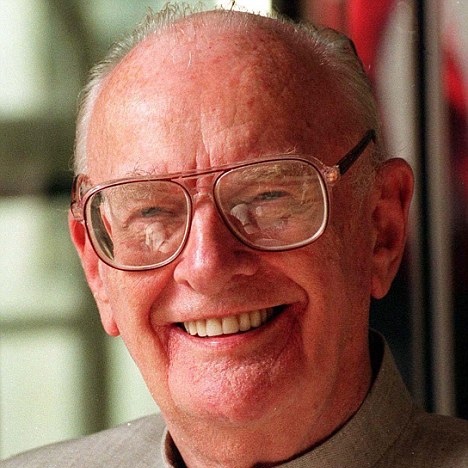
Arthur C. Clarke
1917 – 2008 CE
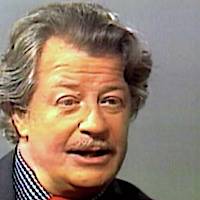
James Clavell
1921 – 1994 CE
Fictionalizing and fictional historian
Thought of as mainly a novelist but at heart an historian with a story-tellers flare for the dramatic, Clavell romanticized history and made it entertaining. Commentators describe Plato as more of a fictional, literature author than an historian; and, in a similar way, Clavell could be deemed more of a historian than a fiction writer. He appears in his novels as Peter Marlowe, a prisoner of war in King Rat, a novelist in Noble House, and a friend in Whirlwind. The non-fictional foundations of his books describe Japanese prison camp life in King Rat, William Adams—the first of a tiny number of Westerns to become a samurai—in Shogun, Jardine Matheson—founding father of one of the first Hong Kong trading companies and now one of the world’s largest companies, and in Whirlwind, the 1979 Iranian revolution in Iran. Also a filmmaker, his credits include The Fly in 1958, To Sir with Love and The Great Escape in the 1960’s, and many popular TV miniseries based on his books.
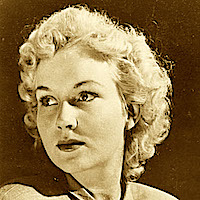
Carolyn Cassady
1923 – 2013 CE
Formal artist at 9 years old selling her first painting at 14, award winning set designer and head of make-up at 16, author, “grande dame of the Beat Generation,” founding member of the Academy of Parapsychology and Medicine, mother of 3 Neal Cassady children, and Jack Keroac love partner; Carolyn Cassady later regretted but divorced Neal launching him into further travels with Ken Kesey's band of Merry Pranksters (described in Electric Koolaid Acid Test) and his death in Mexico. Student of Erich Fromm, Dane Rudhyar, Edgar Cayce, and Peter Drucker; symbol in On the Road for integrity and goodness; muse for and character in the writings of Kerouac, Tom Wolfe, John Clellon Holmes, and Ken Kesey; portrayed by Kirsten Dunst and Sissy Spacek in movies; she took care of their children by herself when Neal spent 2 years in jail for a tiny amount of marijuana and worked to prevent young people from following in the self-destructive, Beat-imitating misunderstandings.
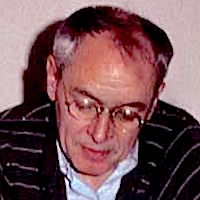
R. D. Laing
1927 – 1989 CE
Shaman, “acid Marxist,” counter-culture high priest, “Elvis of the psyche,” British counterpart to Timothy Leary, friend of Chögyam Trungpa, and psychiatrist to Sean Connery, the Beatles, Jim Morrison, and many other famous 1960’s icons; R. D. Laing was also a serious scholar who challenged orthodox psychology denouncing electro shock, chemical therapy, and the dehumanizing incarceration of the mentally ill. He developed Bateson’s double-bind theory, promoted safe haven centers, and the community-care model that has become today’s norm. Inspired by the Mahasiddha tradition of transmutation and growing the positive in perceived negative, he inspired techniques exemplified by the time he treated a patient with catatonic immobility by helping her get a job as an artist’s model.
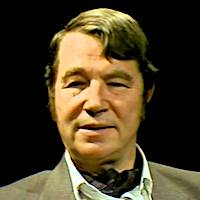
Colin Wilson
1931 – 2013 CE
Author of over 100 books, philosopher, novelist, and instigator of “optimistic existentialism;” Wilson wrote The Outsider in 1956 when he was only 24 years old and—translated into 30+ languages—it hasn’t been out of print since. A deep interest in metaphysical themes led him to in-depth studies and writings on people like Aleister Crowley, Gurdjieff, Helena Blavatsky, Paracelsus, Carl Jung, Wilhelm Reich, Rudolf Steiner, and P. D. Ouspensky. His challenging and ground-breaking reflections spawned an International Conference that began in 2016. Dissolving most boundaries of conformity, he brought an extremely open-minded and non-conformist views on most modern issues; but, went so far in that direction, he often fell into believing naive and primitive speculations. In spite of—or possibly because of—these “failings,” his books challenge conventionality and open conceptual, panoramic perspectives on the most important issues we struggle with on political, social, and personal levels.
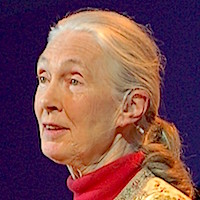
Jane Goodall
1934 CE –
Adventurer, environmental activist, scientist, pioneering primatologist, and wise gardener; Jane Goodall became UN Messenger of Peace, the world's best expert on chimpanzees, founder of the Roots & Shoots program, and an important influence on young people to choose helping the world over selling out to lucrative careers that plunder the planet. Criticized for changing the chimpanzee social group dynamics, she became an example of McLuhan’s dictum that “every new technology requires a new war” because it disrupts the status quo social order. In this case, the disruption went beyond the chimpanzee social order and also disrupted the human-to-animal and human-to-plant hierarchies. As Stevie Nicks describes her in the song Jane, “There are angels here on earth.”

John Lennon
1940 – 1980 CE
Poet of our age, 20th Century social conscience, inscrutable, uncompromising, brave and outrageous; John Lennon personifies the Lao Tzu lineage and left a lasting and profound impact on the international evolution of consciousness. Uncompromising psychological prophet, he distilled and magnified both our dark side shadows and bright, golden age potentials. Reviled by the Nixon administration and investigated by the FBI, he’s now number 8 on the list of 100 Greatest Britons. Anthem writer for the counterculture and the anti-war movement, reviled by the Nixon administration and investigated by the FBI, he’s now number 8 on the list of 100 Greatest Britons.
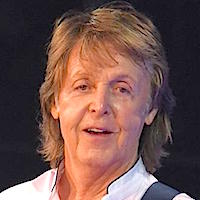
Paul McCartney (Sir James Paul McCartney)
1942 CE –
Described by Ringo star as "pleasantly insincere" and by John Lennon as “all pizza and fairytales,” McCartney sits on the more conservative and conventional side of the art world though this may have helped him avoid the early death pattern so common with famous rock stars. Knighted for his contribution to music and along with Lennon the most celebrated singer-songwriter of our times; McCartney wrote the best-selling Beatles single, "Hey Jude,” one of the most covered songs in modern music’s history, “Yesterday” (2,200+ versions), and wrote or co-wrote music for 60 gold records and 32 songs that became number one hits selling over 100 million singles and 100 million albums. Not stuck in only fame and fortune, he’s worked hard promoting animal rights, poverty alleviation, vegetarianism, and land mine charities.
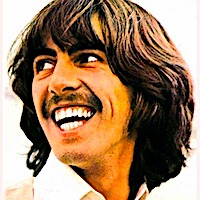
George Harrison
1943 – 2001 CE
Guitar-playing philanthropist
Singer-songwriter, "the quiet Beatle", guitar-playing genius, Hare Krishna fan, Yogananda student, philanthropist, and film producer; George Harrison influenced popular music toward folk rock and introduced Indian culture and music to the West. Two-time Rock and Roll Hall of Fame inductee, he co-founded the Traveling Wilburys, collaborated on songs and music with Bob Dylan, Eric Clapton, Ringo Starr and Tom Petty. Rolling Stone magazine ranked him number 11 in their list of the "100 Greatest Guitarists of All Time.” He supported the civil rights movement, protested against the Vietnam War, supported Greenpeace and nuclear disarmament, recorded pop music's first charity single to support Bangladesh which earned almost $14 million, and established a UNICEF Humanitarian Fund.
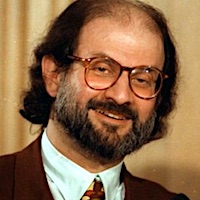
Salman Rushdie
1947 CE –
Fearless antagonist of Islamic fundamentalism
Prolific, award-winning, and fearless writer, Rushdie’s novels combine magical realism with historical fiction and concentrate on the interplays between Western and Eastern civilization. An antagonist of religious extremism and advocate for Islamic reform, his books were banned in many Muslim countries, he was put on an Al-Qaeda hit list, and the spiritual leader of Iran—Ayatollah Khomeini—issued a fatwā ordering his execution. When knighted on the English Queen’s birthday in 2007, mass demonstrations against him broke out in Malaysia and Pakistan while many Muslims campaigned publicly for his death. He supported Barack Obama’s election and the UK vote to stay in the EU, criticizes the Republican Party, champions ways to end racial discrimination, and actively supports feminism.
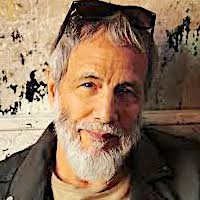
Cat Stevens (Steven Demetre Georgiou, Yusuf Islam)
1948 CE –
Singer-songwriter, musician, humanitarian, and brave artist dedicated to principle over fame and fortune; Cat Stevens had a Greek Orthodox father, a Baptist mother, went to a Catholic school, wrote an album based on a famous Zen teaching, converted to Islam and abandoned his musical career for 30 years. He used his music-derived wealth to promote Muslim philanthropic and educational causes and continues to help famine victims in Africa and thousands of orphans and families in the Balkans, Indonesia, and Iraq. Although always condemning terrorism and Islamic extremism, he was deported by Israel and ironically after the 9/11 attacks while on a tour with Dolly Parton promoting the song Peace Train; he was put on a US No-Fly list, briefly detained, and forced to fly back to the UK. Today he still continues his musical, philanthropic, and peace-making work.
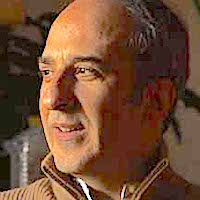
Peter Kingsley
1953 CE –
Sufi, mystic, author, philosopher, scholar; Kingsley describes a "flowering of consciousness” and the birth/beginning of western civilization during the pre-Socratic Greek period based on the influence of Parmenides and Empedocles. He describes Parmenides' nameless goddess who uses words as esoteric seeds and paradoxical divine logic to reveal unity and reality’s oneness. These seminal Orphic and Pythagorean views later distorted by Plato and Aristotle show remarkable similarities to early Buddhist, Taoist, and shamanistic traditions; modern Vedanta, Zen, and Dzogchen.
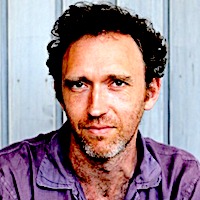
Roman Krznaric
c. 1964
Practical, popular, modern philosopher
Philosopher, gardener, human rights activist, academic, tennis player, and furniture maker; Krznaric grew up in Australia, Hong Kong and the UK going on to help found The School of Life, the world’s first Empathy Museum, and the digital Empathy Library. One of modern European’s most popular philosophers, he works with organizations from prisons to Google to the United Nations and describes paths toward the transformation of society. His transforming influence spreads over educational reforms, ecological campaigns, progressive politics, innovative inventions, and social entrepreneuring.
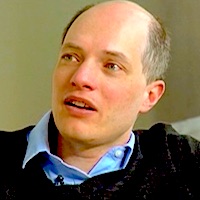
Alain de Botton
1969 CE –
Philosophic link between ancient wisdom and modern challenge
School of Life and Living Architecture co-founder, philosopher, public speaker, author, and ”Fellowship of Schopenhauer" winner; Alain de Botton makes major steps in linking philosophy to the practical concerns of everyday life. His many books, talks, and “School of Life” learning sessions help bring down the deep philosophical insights of ancient and modern thinkers into the practical realms of modern life. The School of Life—based in 11 different countries—provides an “emotional education” that challenges conventional universities by focusing on livelihood, relationships, and wisdom rather than only knowledge, by searching for meaningful life paths, and by expanding ways of evolving a greater cultural goodness. From a very wealthy but materialistic family, de Botton shuns a vast trust fund and lives only on his personal income.
Related Sources (0 sources)
Quotes about the British Lineage (14 quotes)

“The English are great lovers of themselves, and of everything belonging to them; they think there are no other men than themselves, and no other world but England; and whenever they see a handsome foreigner they say that 'he looks like an Englishman,' and that it is a great pity that he is not.”
Comments: Click to comment

“If any of the provinces of the British empire cannot be made to contribute towards the support of the whole empire, it is surely time that Great Britain should free herself from the expense of defending those provinces in time of war, and of supporting any part of their civil or military establishments in time of peace, and endeavor to accommodate her future views and designs to the real mediocrity of her circumstances.”
Comments: Click to comment

“Men of England, Heirs of Glory,
Heroes of unwritten story,
Nurslings of one mighty mother,
Hope of her, and one another,
Rise, like lions after slumber,
In unvanquishable number”
Comments: Click to comment

“The struggle between liberty and authority is the most conspicuous feature in the history of... Greece, Rome, and England.”
Comments: Click to comment
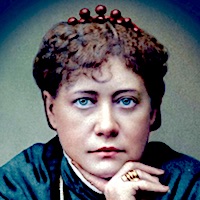
“Wisdom and Truth are synonymous terms, and—well-known by representatives of the Church of England—the Sermon of the Mount would, in its practical application, mean utter ruin for their country in less than three weeks”
Comments: Click to comment

“An Englishman is a person who does things because they have been done before. An American is a person who does things because they haven't been done before.”
Comments: Click to comment

“[Aeneas] is the symbol of Rome; and, as Aeneas is to Rome, so is ancient Rome to Europe. The Roman Empire and the Latin language were not any empire and any language, but an empire and a language with a unique destiny in relation to ourselves...”
Comments: Click to comment
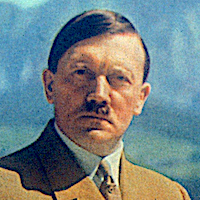
“We can safely make one prophecy: whatever the outcome of this war, the British Empire is at an end. It has been mortally wounded. The future of the British people is to die of hunger and tuberculosis in their cursed island.”
Comments: Click to comment

“England is the most class-ridden country under the sun. It is a land of snobbery and privilege, ruled largely by the old and silly. But in any calculation about it one has got to take into account its emotional unity, the tendency of nearly all its inhabitants to feel alike and act together in moments of supreme crisis. It is the only great country in Europe that is not obliged to drive hundreds of thousands of its nationals into exile or the concentration camps.”
Comments: Click to comment
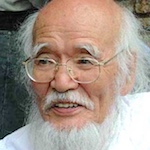
“the decline of European civilization arises from the Western philosophy of placing onesef first; that in trying to protect one's person with a stone castle Europeans have ended by enclosing the self within a prison.”
Comments: Click to comment
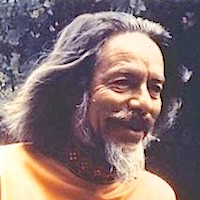
“The culture of Victorian England—a culture of the most elegant lasciviousness—offers a striking example of this religious prurience. Extreme modesty and prudishness in the home so heightened the fascination of sex that prostitution, even for the upper classes, flourished.”
Comments: Click to comment
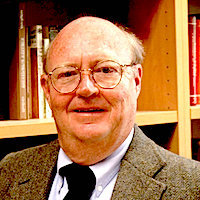
“To many, including Winston Churchill, the British Empire was a great force for good. To an unprepossessing Indian lawyer, the British Empire, which saw itself as the bastion of liberty, was evil, for it rested on a lie. It denied to many of its subjects the very equality that was the essence of freedom... Strong in the truth, he used moral power to bring a great power to its knees. Gandhi focuses on his entire life as a search for truth, teaching us that there are many roads to wisdom and many ways to fight the battles of life.”
Comments: Click to comment
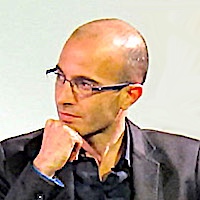
“Napoleon made fun of the British, calling them a nation of shopkeepers. Yet these shopkeepers defeated Napoleon himself, and their empire was the largest the world has ever seen.”
Comments: Click to comment
Comments (0)